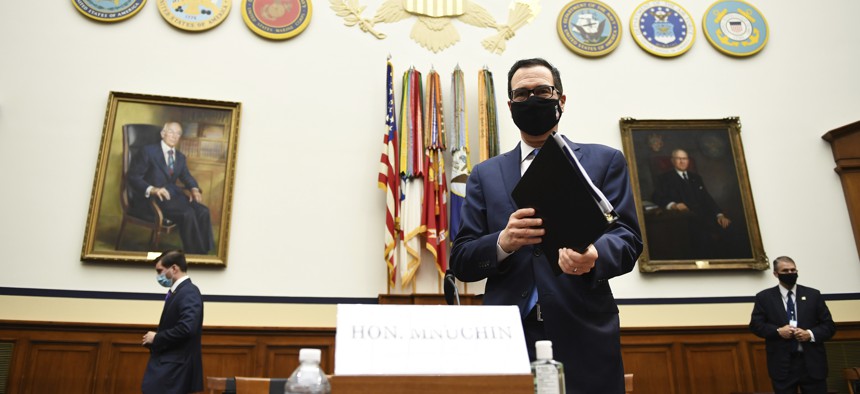Business Loans, Unemployment Insurance to Factor into Talks on Next Coronavirus Bill

Treasury Secretary Steven Mnuchin arrives to testify before a House Small Business Committee hearing on oversight of the Small Business Administration and Department of Treasury pandemic programs on Capitol Hill in Washington, Friday, July 17, 2020. Kevin Dietsch/Pool via AP

Connecting state and local government leaders
Negotiations over the next coronavirus aid package will begin in earnest next week when Senate Republicans are expected to introduce their proposal.
A second round of narrowly targeted loans for businesses hit hardest by the coronavirus pandemic could be part of the next round of coronavirus relief aid negotiations, which will begin in earnest Monday when the Senate returns from its recess.
Treasury Secretary Steven Mnuchin said Friday that the Trump administration would like to see the Paycheck Protection Program, the lending program that has distributed $520 billion to companies, extended on a targeted basis to provide restaurants, hotels and other travel and hospitality businesses with an additional round of relief. But he said more safeguards will be needed to prevent waste, fraud and abuse within the program.
“I think this time we need to have a revenue test and make sure that money is going to businesses that had significant revenue declines,” Mnuchin said while testifying before the House Committee on Small Business.
The Republican-led Senate will return from its recess next week, at which point Republican lawmakers are expected to introduce their proposal for the next coronavirus relief package. The Democrat-led House has already passed a $3 trillion coronavirus relief proposal, but the price tag for the plan Republicans say they are considering is significantly lower at $1.3 trillion.
In addition to agreement on a price tag, lawmakers will have to resolve a number of disputes over provisions to be included in the bill.
Democrats’ HEROES Act would direct more than $900 billion for state and local governments, provide another round of direct payments to Americans, and extend federal unemployment benefits through January.
Republicans have already come out in opposition to many of the provisions included in the House bill, including an extension of the $600-a week federal unemployment benefits that they say disincentivizes people from returning to work. The additional unemployment money is set to expire at the end of July, with the last extra payments set to go out on July 26, and White House officials have signaled openness to negotiations over an extension of narrower benefits.
This week, Senate Majority Leader Mitch McConnell warned that a relief package will not pass the Senate without provisions to limit lawsuits stemming from the coronavirus outbreak.
“I’m not going to put a bill on the floor of the Senate that doesn’t have liability protection in it,” McConnell said this week. “This would protect hospitals, doctors, nurses, businesses, universities, colleges, K-12, everyone dealing with coronavirus who acted in good faith.”
House Speaker Nancy Pelosi said this week she would be open to delaying the start of the House summer recess, saying lawmakers “have to come to an agreement.” But she scoffed at the $1.3 trillion that Republicans want to allot for the next aid package, saying it simply isn’t enough to cover all of the challenges the country is facing.
“The point is, if we don't invest the money now, it'll be much worse,” she said.
Andrea Noble is a staff correspondent with Route Fifty.

NEXT STORY: ‘One-Third of Our Income Is Gone’: A Rural State Faces a Big Budget Gap




